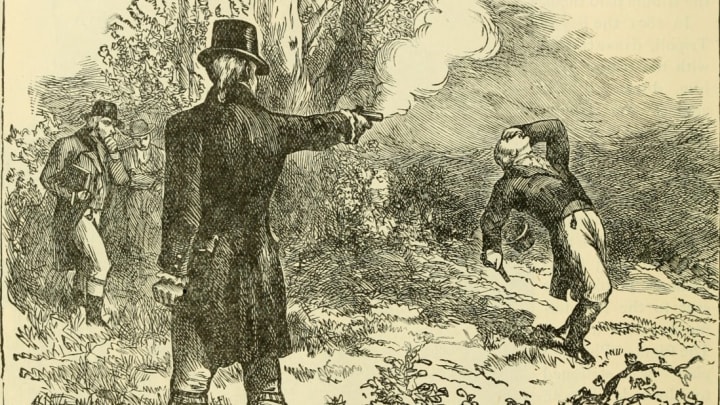The duel between Alexander Hamilton and Aaron Burr is perhaps the most famous duel in United States history. Up until the premiere of the hit Broadway musical, it was the only thing many people knew about either man. Here are nine facts about that fateful fight.
1. Alexander Hamilton and Aaron Burr were large figures in early United States politics.
Alexander Hamilton was the first Secretary of the Treasury, and the guy behind the Federalist Papers. Aaron Burr was, at the time of the duel—July 11, 1804—the third Vice President of the United States. Both were accomplished lawyers and military men.
2. There’s a reason the duel between Alexander Hamilton and Aaron Burr took place in New Jersey.
The duel went down in Weehawken, New Jersey, a spot that was frequently used for just such occasions. Because New York had recently outlawed dueling as a legitimate way of settling grievances, aspiring duelists would simply row across the Hudson River.
3. Alexander Hamilton and Aaron Burr had a contentious history.
The two men had been foes since at least 1791, when Burr defeated Hamilton’s father-in-law for a Senate seat. And it went downhill from there. Burr was a Democratic-Republican, and Hamilton was a Federalist, but that was just the tip of their iceberg of ill will.
For over a decade, the two used the press and mutual acquaintances (other Founding Fathers) to hurl insults and accusations at one another. In April of 1804, the Albany Register ran an article that stated Hamilton, while at a political dinner, expressed a “despicable opinion” of Burr. During the next months, the two wrote a series of incredibly polite-sounding, hateful letters.
4. Alexander Hamilton and Aaron Burr had previously worked together as lawyers.
Four years before the duel, Hamilton and Burr worked together on one of the most sensational trials of the era. In what must have been a very awkward working relationship, the pair defended Levi Weeks, a well-heeled young man accused of murdering his working-class girlfriend, Elma Sands, and throwing her body down a well. Despite a veritable mountain of evidence, the young man was acquitted after only five minutes of jury deliberation.
Just after the verdict was read, Elma’s enraged sister pointed at Hamilton and cursed him, saying, “if thee dies a natural death, I shall think there is no justice in heaven!” It took a few years, but Hamilton’s death was anything but natural.
5. Alexander Hamilton’s son died in a duel three years before the Hamilton-Burr duel.
It seems the Hamiltons were a hot-headed clan. In 1801, a 27-year-old lawyer named George Eacker made an inflammatory speech criticizing Alexander Hamilton. Hamilton's son, 19-year-old Philip Hamilton, and a friend confronted Eacker in his box at the theater. The two young men engaged in what Eacker termed “hooliganish” behavior, prompting the lawyer to call them “damned rascals.” In response, Philip and his friend challenged Eacker to duel. Both Eacker and the friend escaped unscathed from their duel, but Philip was not as fortunate.
6. Alexander Hamilton and Aaron Burr followed the Code Duello.
According to Rule 16 of the code, the challenged (in this case, Hamilton) had the right to choose the weapons. Hamilton chose a set of dueling pistols owned by his brother-in-law, John Barker Church, who'd once participated in a shot-less duel with Burr. The Church weapons, as they came to be called, had a macabre history that Hamilton would’ve known well: They were the same pistols used in the duel that killed his son, Philip.
The pistols remained in Church’s family until 1930, when his granddaughter sold them to The Bank of the Manhattan Co.—a bank founded by Aaron Burr. That bank eventually was one of the several that merged to become JP Morgan Chase & Co.
7. Alexander Hamilton fired first during the duel, but Aaron Burr fired the fatal shot.
The two men, each with his own entourage, took separate boats across the Hudson to the duel site. The details of their accounts differ in some respects, but all witnesses maintained that both men followed the highly ritualized Code Duello.
Hamilton fired first—into the air. Burr returned fire—into Hamilton, who died the next day.
Did Hamilton intentionally throw away his fire? Likely. The night before the duel, he wrote an open letter titled Statement on Impending Duel with Aaron Burr. In it, he wrote, “I have resolved, if our interview is conducted in the usual manner, and it pleases God to give me the opportunity, to reserve and throw away my first fire, and I have thoughts even of reserving my second fire.”
8. The duel ruined Aaron Burr’s political career.
Murder charges were brought against Burr in both New York and New Jersey, and he avoided them by simply staying out of those states. He kept to Washington and completed his term as Vice President, but his political career was over. Though all charges against him were eventually dropped, his life was never the same after the duel.
9. Duels were not rare in early America.
Both Hamilton and Burr had been involved in non-fatal duels before their unfortunate match. Among upper class gentlemen, duels were not uncommon. However, they were rarely fatal. The rules provided many opportunities for either party to apologize along the way, and the flintlock pistols used were not very accurate and prone to misfire.
A version of this story was originally published in 2011; it has been updated for 2021.
